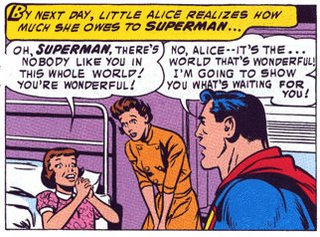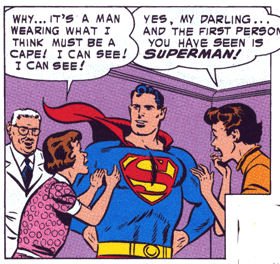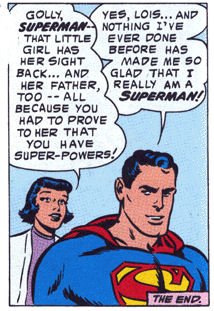What do I fear? Myself? There's none else by.
Richard loves Richard: that is, I am I.
So, Tony Blair has gone mad. This is no great surprise. Politicians go mad during their third term in office. The United States constitution recognises as much. Blair's recent speech to his bosses at News International provides us with a depressing insight into his current state of mind.
Blair says–stop me if you've heard this before–that the old political dichotomy between Left and Right no longer applies.
Most confusingly for modern politicians, many of the policy prescriptions, cross traditional Left/Right lines. Basic values, attitudes to the positive role of Government, social objectives - these still do divide along familiar Party lines. But on policy the cross-dressing is rampant and is a feature of modern politics that will stay. The era of tribal political leadership is over. But across a range of issues, there is no longer a neat filing of policy to the Left or the Right.
This is not exactly news: it's the theory on which New Labour was founded. Although Blair has stopped using the phrase, the concept of the Third Way is central to his thinking. It's the nearest thing he has to a political philosophy. Whatever he is talking about–foreign policy, education, law and order–he invariably says that in the Olden Days there was a debate between two opposing viewpoints; but that he, Tony Blair, discovered that this polarity was redundant, and everybody now agrees with him. In his recent speech in Bristol, Blair claimed that there used to be a difference of opinion between those who thought that you should deal with the social causes of crime and those who thought that you should simply punish criminals.
In retrospect, the argument looks sterile, silly even. New Labour finally arrived at what has now become the conventional position, summed up in the phrase: 'tough on crime, tough on the causes of crime'.
The Third Way isn't moderation–navigating a mid-point between too-far-to-the-Right and too-far-to-the-Left. New Labour is supposed to be a new thing: neither Left, nor Right but somehow a synthesis of both.
Of course, this is nonsense: there is no such thing as a synthesis between two mutually exclusive actions. Blair's Third Way turns out to be a re-packaging of bog-standard centre-right ideology. The synthesis between punishing criminals and dealing with the social causes of crime turns out to be building more prisons and sending more people to jail; the synthesis between nationalisation and privatisation turns out to be, er, privatisation.
So, take a look at Blair's plans to abolish–I'm sorry, did I say abolish? I meant 'reform'–the welfare state. Blair says that 'old fashioned' welfare systems and public services can't bring about social justice.
Today's world means that social justice can only be achieved through education, not regulation; through enterprise flourishing and creating wealth, not being constrained.
But this has nothing to do with 'today's world'. In yesterday's world, there were people who thought that you should deal with poverty by redistributing wealth–taxing the rich and using the money to pay for social security cheques and public services. And people will doubtless continue to believe this in tomorrow's world, and in any parallel worlds Tony Blair chooses to visit. People who believe in this are called 'The Left'. And there always have been, and always will be, people who think that if governments would only stop taking money away from the rich then the rich would build factories, open shops, hire servants and thus create wealth and give jobs to the poor. People who think this are called 'The Right'. Blair thinks that the Right are right and the Left are wrong. You may very well agree with him. But it's nonsense to pretend that something in the Modern Age has changed the nature of the debate. This is the old, old clash between socialists and capitalists, and Blair knows very well which side he's on.
Oh: and he also says that 'fairness, equality, opportunity for all' are 'good progressive values' but that although 'the values are constant, their application has to be dynamic.' But hang on -- aren't 'values' supposed to be the one area where people are still divided along traditional party lines? So if, as a loyal Labour party supporter, Tony believes in the socialist Values of Fairness, Equality and Opportunity, does that mean that he thinks that they are the kind of values which the Conservative Party rejects?
Proclaiming a consensus where none actually exists is a classic tactic to disenfranchise the opposition. If 'everyone agrees' that the argument between the Left and the Right is over, then it follows that anyone putting forward a Left-wing position can be ignored. They're not exactly wrong; they're merely camped out in the jungle fighting enemies who don't exist any more. Tony Benn, George Galloway, about two-thirds of the Labour Party and myself are thus discovered to be un-persons. When Blair says that politics is no longer divided between the Left and the Right, he means that the Left, in the person of the Honourable Member for Sedgefield, has rolled over and died. Which is presumably why he has travelled all the way to California in order to ritually kiss the bottom of the most Right-wing newspaper magnate the world has ever known.
The argument between the Left and the Right was an argument between two intellectually plausible positions. People became Socialists or Conservatives as a result of an intellectual process. Michael Foot used to meet up with Barbara Castle and other friends in order to study the writings of Karl Marx together–not something which you can really imagine Gordon Brown and John Prescott doing. It was therefore possible for both sides to engage in an intellectual debate; and even for a genuine consensus to emerge. If we both want a socialist utopia, then we can discuss whether this would be better achieved by incrementally increasing workers rights, or by storming the gates of Buckingham Palace. And you can challenge us about whether the workers would be happier under Socialism than under a prosperous Capitalist system. In the meantime, we can work together to provide free health care for poor people.
But according to Blair, this Left versus Right debate has been superseded by–I promise I'm not making this up–a debate between Open and Closed. The three most important debates in European politics are about protectionism, isolationism and 'nativism', which Blair defines as 'relating to immigration and national identity.'
In each case the issue is: 'Open or Closed'. The response to globalisation can be free trade, open markets, investment in the means of competition: education, science, technology. Or it can be protectionism, tariffs, tight labour market regulation, resistance to foreign takeovers.
Countries can choose foreign policies that are engaged and activist, seeking to sort out the world's problems; or try to avoid their problems; refrain from controversy or picking sides, isolating a nation from the pain of the hurly-burly of the world's challenges, but also from the opportunity to shape their outcome.
And not a major country anywhere is not riven by the debate on migration: do we welcome it as infusing new blood and ideas; or do we fear it as undermining our identity?
It isn't immediately obvious what the views which Blair has labelled as Open and those he has labelled as Closed have in common. Surely you could support a non-interventionist ('Closed') foreign policy, but a liberal ('Open') immigration policy? And what would inform your decision about whether to be Open or Closed in a particular instance? Not, says Blair any kind of political theory or ideology:
Where leaders stand on these issues has little to do with being on the Left or the Right but everything to do with modern or traditional attitudes to a changing world.
But in Blairspeak 'modern' means good and 'traditional' means bad, so to say that 'traditional' people support the Closed position is simply to say that the Closed position is wrong. Closed people are against education, science and technology; they don't want to sort out the world's problems; they don't like new ideas. Left vs Right was a debate between two credible positions. Open vs Closed is a row between the obviously right and the obviously wrong. It's an argument between nice and nasty, sensible and silly, modern and old fashioned–which, by a staggering coincidence, turns out to mean 'between those who agree with Tony Blair, and everyone else.'
Blair is absolutely explicit here: the Closed half of the debate has absolutely no merit and nothing to offer:
In this battle - 'Open versus Closed' - those on the 'Open' side of the argument will meet fierce opposition. Yet the 'Closed' side of the argument in truth has nothing to offer a nation except the delusion that the tide of change can be turned back; or alternatively a weaker version of the same delusion, namely that hard choices can just be evaded.
He references his 1999 conference speech, in which he labelled his enemies 'the forces of conservatism'. This was, he says, widely misunderstood: he wasn't attacking the Conservative party, but small-c conservatives who opposed change. Of course, anything a government does involves changing something. If you oppose a particular change, you are, by definition, a conservative. To say that the 'forces of conservatism' are the baddies is perilously close to saying 'change is always good; to oppose change is always bad'. But how is this different from saying 'whatever the government does–whatever I, Tony Blair do–is right'?
If you opposed the war in Iraq, it follows that you support isolationism and that you don't want to sort out the worlds problems. You feel this way because you are Closed; which means that, as the result of a delusion, you hold 'traditional' views of the world. You are part of the forces of conservatism; a baddy. It follows that we don't have to listen to anything you say: indeed, as Leaders, our job is not to engage in a debate with Closed people, but to simply press on, resolutely, with what we know is right.
But how do we leaders know what is right? Not through conventional religion or morality. Both Tony Blair and George Bush have drawn some fire for saying that they think that God influences their decisions. It is slightly too easy to lampoon Bush's folksy religious language: when someone from the evangelical tradition says 'I feel that God told me to do this' they probably only mean 'I feel that I did what was right'. Whatever you may have read in the Guardian, neither Blair nor Bush have ever suggested that a supernatural being appeared unto them and said 'Invade Iraq!' or 'Expand the provision of nursery school places for the under-3s!'
However, if you suggest to Tony that he acted reprehensibly in the run-up to the Iraq war, his response is to assert that he sincerely believes that what he did was right; although he accepts that other people believe, equally sincerely, that he was wrong. 'Beliefs' seem to be something like birthmarks or allergies; you have them, you're stuck with them; but you certainly can't change them through rational discourse. When asked about how the Iraq war related to his religious faith, Blair didn't try to prove that what he did was correct according to the precepts of the Bible or the writings of Christian holy men. He certainly didn't pay much attention to what the Archbishop of Canterbury or the Pope thought. He simply said that he believed his actions would some day be judged by God.
Some people might think that the way to find out if an action is 'good' or 'bad' is to see if it follows some agreed set of rules: the Bible, the Koran, the Constitution, the Geneva Conventions, the Boy Scout Law. But Blair thinks that his actions were good because he was experiencing a subjective emotional state called 'sincerity' at the time. And he trusts that in the future they will be declared to have been good according to a set of ineffable divine criteria. Only Tony Blair knows whether he really was sincere or not; only God knows what will happen on Judgement Day. So if you aren't Tony Blair or God, you had better shut up.
The present speech doesn't mention God, thank God. But it does say that Tony Blair's foreign policy is right because Tony Blair feels that it is right:
My anxiety over foreign policy is not in relation to the debate about terrorism or security. I have many opponents on the subject: but complete inner-confidence in the analysis of the struggle we face.
And what to do when those pesky Closed people suggest that it's possible that, even if you are very, very confident indeed, you might still be wrong?
The world changes fast; the policy changes necessary to cope are hugely challenging; opposition from traditionalists is immense. In these conditions, political leaders have to back their instinct and lead.
'Back your instinct.' Well of course. With ideology abolished, and with 'God' appearing to be synonymous with 'my own conscience' all you can do is follow your instinct; your gut feeling. And gut-feeling, unlike Das Kapital, isn't something that you can argue with. I like Marmite. Look, you know, I just happen to sincerely believe that Marmite is delicious. I have an inner-confidence about that. I accept that you sincerely believe that Marmite is disgusting. But there is no way that I can prove to you that you are wrong. We'll just have to wait until the Day of Judgement and let God sort it out.
In the meantime, if you are a leader, just do whatever comes into your head. In fact, do the first thing which comes into your head, because 'caution is error, to hesitate is to lose'. It doesn't necessarily matter what you do, provided you do something. 'Back you instincts, and lead.' Being a leader is an end in itself–not necessarily a leader of anything; not the spokesman of a party or the representative of an electorate, but just a leader.
For a leader, don't let your ego be carried away by the praise or your spirit diminished by the criticism and look on each with a very searching eye. But for heaven's sake, above all else, lead.
'For heaven's sake, lead.' The real distinction is not between Open and Closed. It's between Us, the Leaders, and you, the Led. Our function is to follow our gut-instinct; you're function is to follow us. The direction doesn't particularly matter.
So. For the next few months, we are going to being ruled by a raving lunatic who thinks that the basis of political decision making is 'whatever Tony feels like at the time.' But this is not the problem. The problem is that after a brief interregnum, David Cameron is going to be exactly the same.



.jpeg)